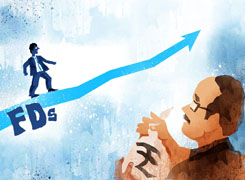Ramalingam Kalirajan |10870 Answers |Ask -Follow
Mutual Funds, Financial Planning Expert - Answered on Jun 03, 2024
He has an MBA in finance from the University of Madras and is a certified financial planner.
He is the director and chief financial planner at Holistic Investment, a Chennai-based firm that offers financial planning and wealth management advice.... more

Hi sir, One of FD is maturing next week(32lac). Please advise whether this to be invested in FD or mutual funds. If mutual funds then advise the mutual funds to invest. My age is 60yrs. Please advise. Ashok
Congratulations on reaching this milestone. You have Rs 32 lakhs from a maturing Fixed Deposit (FD). At the age of 60, it’s vital to balance safety, liquidity, and growth in your investments.
Understanding Your Financial Goals
Before diving into investment options, let's understand your financial goals. Do you need regular income, preservation of capital, or growth? Your age suggests a need for a conservative approach, but with some exposure to growth for inflation protection.
Fixed Deposit: Safety and Predictability
Fixed Deposits (FDs) are safe and predictable. They offer guaranteed returns, making them suitable for risk-averse investors.
Benefits:
Safety: Capital is protected.
Guaranteed Returns: Interest rates are fixed.
Liquidity: Can be broken with a penalty if needed.
Drawbacks:
Low Returns: Typically lower than inflation.
Taxable Interest: Interest is fully taxable.
Mutual Funds: Growth and Diversification
Mutual Funds offer diversification and potentially higher returns. Given your age, a balanced approach focusing on low to moderate risk is ideal.
Benefits:
Higher Returns: Potentially higher than FDs.
Diversification: Spread across various assets.
Tax Efficiency: Long-term capital gains are taxed favorably.
Drawbacks:
Market Risk: Returns are not guaranteed.
Complexity: Requires understanding fund types.
Conservative Mutual Funds
Given your need for safety and some growth, consider conservative mutual funds. These include debt funds, hybrid funds, and balanced advantage funds.
Debt Mutual Funds
Debt funds invest in fixed-income instruments like government bonds and corporate debt. They are less risky than equity funds.
Benefits: Stable returns, low risk.
Suitable For: Capital preservation and modest growth.
Hybrid Mutual Funds
Hybrid funds invest in both equity and debt. They offer a balance between risk and return.
Benefits: Diversified risk, balanced returns.
Suitable For: Moderate risk appetite and inflation protection.
Balanced Advantage Funds
Balanced advantage funds dynamically adjust between equity and debt based on market conditions.
Benefits: Automated balance between risk and return.
Suitable For: Those who want professional management of asset allocation.
Evaluating FD vs. Mutual Funds
Safety and Returns
FD: Offers safety and predictable, but lower returns.
Mutual Funds: Potential for higher returns, but with market risks.
Tax Efficiency
FD: Interest is fully taxable.
Mutual Funds: Long-term capital gains are taxed favorably.
Liquidity
FD: Liquidity comes with penalties.
Mutual Funds: Generally more liquid, with easy withdrawal options.
Personalized Investment Strategy
Given your age and need for a balanced approach, here’s a suggested strategy:
1. Split the Investment
Divide Rs 32 lakhs into two parts: 50% in FDs for safety and 50% in mutual funds for growth.
2. Choose Suitable Mutual Funds
Select conservative funds to balance risk and return. Here are some categories:
Debt Funds: Invest Rs 10 lakhs for stability.
Hybrid Funds: Invest Rs 6 lakhs for balanced growth.
Balanced Advantage Funds: Invest Rs 6 lakhs for dynamic management.
3. Regular Review
Regularly review your portfolio to ensure it aligns with your goals and market conditions.
Practical Steps for Implementation
Consult a Certified Financial Planner: Get personalized advice to align investments with your financial goals.
Research Funds: Look for funds with a good track record, low expense ratio, and suitable risk profile.
Diversify: Spread investments across different types of funds to reduce risk.
Monitor and Rebalance: Keep track of your investments and rebalance as needed to maintain the desired asset allocation.
Final Thoughts
Balancing safety and growth is essential at this stage of life. By diversifying your Rs 32 lakhs between Fixed Deposits and conservative mutual funds, you can achieve stability and growth. Regular monitoring and adjustments will ensure your portfolio remains aligned with your financial goals.
Best Regards,
K. Ramalingam, MBA, CFP,
Chief Financial Planner,
www.holisticinvestment.in
Best Regards,
K. Ramalingam, MBA, CFP,
Chief Financial Planner,
www.holisticinvestment.in
You may like to see similar questions and answers below
Sanjeev Govila | Answer |Ask -Follow
Financial Planner - Answered on Mar 01, 2023
Ramalingam Kalirajan |10870 Answers |Ask -Follow
Mutual Funds, Financial Planning Expert - Answered on Apr 24, 2024
Ramalingam Kalirajan |10870 Answers |Ask -Follow
Mutual Funds, Financial Planning Expert - Answered on Apr 05, 2024
Ramalingam Kalirajan |10870 Answers |Ask -Follow
Mutual Funds, Financial Planning Expert - Answered on Jun 25, 2024
Dr Dipankar Dutta |1836 Answers |Ask -Follow
Tech Careers and Skill Development Expert - Answered on Dec 05, 2025
Ulhas Joshi |280 Answers |Ask -Follow
Mutual Fund Expert - Answered on Dec 05, 2025
Dr Dipankar Dutta |1836 Answers |Ask -Follow
Tech Careers and Skill Development Expert - Answered on Dec 04, 2025
Ravi Mittal |676 Answers |Ask -Follow
Dating, Relationships Expert - Answered on Dec 04, 2025
Anu Krishna |1745 Answers |Ask -Follow
Relationships Expert, Mind Coach - Answered on Dec 04, 2025
Anu Krishna |1745 Answers |Ask -Follow
Relationships Expert, Mind Coach - Answered on Dec 04, 2025
Mayank Chandel |2562 Answers |Ask -Follow
IIT-JEE, NEET-UG, SAT, CLAT, CA, CS Exam Expert - Answered on Dec 04, 2025
Mayank Chandel |2562 Answers |Ask -Follow
IIT-JEE, NEET-UG, SAT, CLAT, CA, CS Exam Expert - Answered on Dec 04, 2025
Mayank Chandel |2562 Answers |Ask -Follow
IIT-JEE, NEET-UG, SAT, CLAT, CA, CS Exam Expert - Answered on Dec 04, 2025
Mayank Chandel |2562 Answers |Ask -Follow
IIT-JEE, NEET-UG, SAT, CLAT, CA, CS Exam Expert - Answered on Dec 04, 2025


























